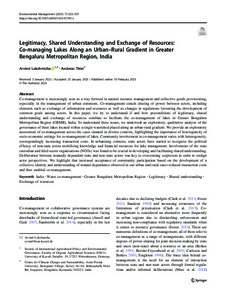| dc.date.accessioned | 2023-03-27T13:30:58Z | |
| dc.date.available | 2023-03-27T13:30:58Z | |
| dc.date.issued | 2023-02-10 | |
| dc.identifier | doi:10.17170/kobra-202303157640 | |
| dc.identifier.uri | http://hdl.handle.net/123456789/14538 | |
| dc.description.sponsorship | Gefördert im Rahmen des Projekts DEAL | ger |
| dc.language.iso | eng | eng |
| dc.rights | Namensnennung 4.0 International | * |
| dc.rights.uri | http://creativecommons.org/licenses/by/4.0/ | * |
| dc.subject | India | eng |
| dc.subject | water co-management | eng |
| dc.subject | Greater Bengaluru Metropolitan Region | eng |
| dc.subject | legitimacy | eng |
| dc.subject | shared understanding | eng |
| dc.subject | exchange of resources | eng |
| dc.subject.ddc | 500 | |
| dc.title | Legitimacy, Shared Understanding and Exchange of Resources: Co-managing Lakes Along an Urban–Rural Gradient in Greater Bengaluru Metropolitan Region, India | eng |
| dc.type | Aufsatz | |
| dcterms.abstract | Co-management is increasingly seen as a way forward in natural resource management and collective goods provisioning, especially in the management of urban commons. Co-management entails sharing of power between actors, including elements such as exchange of information and resources as well as changes in regulations favouring the development of common goals among actors. In this paper, we try to understand if and how preconditions of legitimacy, shared understanding and exchange of resources combine to facilitate the co-management of lakes in Greater Bengaluru Metropolitan Region (GBMR), India. To understand these issues, we undertook an exploratory, qualitative analysis of the governance of three lakes located within a single watershed placed along an urban-rural gradient. We provide an exploratory assessment of co-management across the cases situated in diverse contexts, highlighting the importance of heterogeneity of socio-economic settings for co-management of lakes. Community involvement in co-management varies with heterogeneity, correspondingly increasing transaction costs. In urbanising contexts, state actors have started to recognise the political efficacy of non-state actors mobilising knowledge and financial resources for lake management. Involvement of the state custodian and third-sector organisations (NGOs) was found to be crucial in developing and facilitating shared understanding. Deliberation between mutually dependent state and non-state actors was key to overcoming scepticism in order to realign actor perspectives. We highlight that increased acceptance of community participation based on the development of a collective identity and understanding of mutual dependence observed in our urban and rural cases reduced transaction costs and thus enabled co-management. | eng |
| dcterms.accessRights | open access | |
| dcterms.creator | Lakshmisha, Arvind | |
| dcterms.creator | Thiel, Andreas | |
| dc.relation.doi | doi:10.1007/s00267-023-01795-z | |
| dc.subject.swd | Indien | ger |
| dc.subject.swd | Distrikt Bangalore | ger |
| dc.subject.swd | Ressourcenmanagement | ger |
| dc.subject.swd | Wasser | ger |
| dc.subject.swd | See | ger |
| dc.subject.swd | Legitimität | ger |
| dc.type.version | publishedVersion | |
| dcterms.source.identifier | eissn:1432-1009 | |
| dcterms.source.issue | Issue 3 | |
| dcterms.source.journal | Environmental Management | eng |
| dcterms.source.pageinfo | 523-537 | |
| dcterms.source.volume | Volume 71 | |
| kup.iskup | false | |


